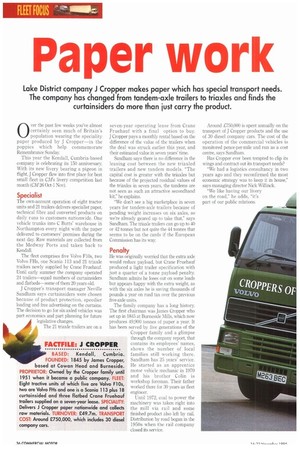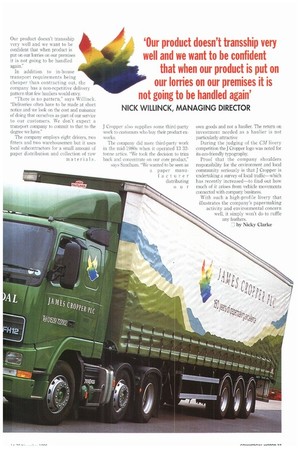Paper work
Page 38

Page 39

If you've noticed an error in this article please click here to report it so we can fix it.
Lake District company .1 Cropper makes paper which has special transport needs. The company has changed from tandem-axle trailers to triaxles and finds the curtainsiders do more than just carry the product.
0 ver the past few weeks you've almost certainly seen much of Britain's population wearing the speciality paper produced by J Cropper—in the poppies which help commemorate Remembrance Sunday.
This year the Kendall, Cumbria-based company is celebrating its 150 anniversary. With its new livery bearing a pigeon in flight, J Cropper flew into first place for best small fleet in CWis livery competition last month (CM 26 Oct-1 Nov).
Specialist
The own-account operation of eight tractor units and 21 trailers delivers specialist paper, technical fibre and converted products on daily runs to customers nationwide. One vehicle trunks into C Butts' warehouse in Northampton every night with the paper delivered to customers' premises during the next day. Raw materials are collected from the Medway Ports and taken back to Kendall.
The fleet comprises five Volvo FlOs, two Volvo FHs, one Scania 113 and 21 triaxle trailers newly supplied by Crane Fruehauf. Until early summer the company operated 24 trailers—equal numbers of curtainsiders and flatbeds—some of them 20 years old.
J Cropper's transport manager Neville Sandham says curtainsiders were chosen because of product protection, speedier loading and free advertising on the curtain& The decision to go for six-axled vehicles was part economics and part planning for future legislative changes.
The 21 triaxle trailers are on a seven-year operating lease from Crane Fruehauf with a final option to buy. J Cropper pays a monthly rental based on the difference of the value of the trailers when the deal was struck earlier this year, and their estimated value in seven years' time.
Sandham says there is no difference in the leasing cost between the new triaxled trailers and new tandem models, "The capital cost is greater with the triaxles but because of the projected residual values of the n-iaxles in seven years, the tandems are not seen as such an attractive secondhand kit," he explains.
"We don't see a big marketplace in seven years for tandem-axle trailers because of pending weight increases on six axles, so we're already geared up to take that." says Sandham. The triaxle trailers can go up to 40 or 42 tonnes but not quite the 44 tonnes that seems to be on the cards if the European Commission has its way.
Penalty
He was originally worried that the extra axle would reduce payload, but Crane Fruehauf produced a light trailer specification with just a quarter of a tonne payload penalty. Sandharn admits he loses out on some loads but appears happy with the extra weight, as with the six axles he is saving thousands of pounds a year on road tax over the previous five-axle units.
The family company has a long history. The first chairman was James Cropper who set up in 1845 at Burneside Mills, which now produces 49,900 tonnes of paper a year It has been served by five generations of the Cropper family and a glimpse through the company report, that contains its employees' names, shows the number of local families still working there. Sandham has 25 years' service. He started as an apprentice motor vehicle mechanic in 1970 and his brother Colin is workshop foreman. Their father worked there for 30 years as fleet engineer.
Until 1972, coal to power the machinery was taken right into the mill via rail and some finished product also left by rail. Distribution by road began in the 1950s when the rail company closed its service. Around 4:750,000 is spent annually on the transport of J Cropper products and the use of 30 diesel company cars. The cost of the operation of the commercial vehicles is monitored pence-per-mile and run as a cost centre, says Sandham.
Has Cropper ever been tempted to clip its wings and contract out its transport needs?
"We had a logistics consultancy in two years ago and they reconfirmed the most economic strategy was to keep it in house," says managing director Nick Willinck.
"We like having our livery on the road." he adds, "it's part of our public relations.
Our product doesn't transship very well and we want to be confident that when product is put on our lorries on our premises it is not going to be handled again."
In addition to in-house transport requirements being cheaper than contracting out, the company has a non-repetitive delivery pattern that few hauliers would envy "There is no pattern," says Willinck. "Deliveries often have to he made at short notice and we look on the cost and nuisance of doing that ourselves as part of our service to our customers. We don't expect a transport company to commit to that to the degree we have."
The company employs eight drivers, two fitters and two warehousemen but it uses local subcontractors for a small amount of paper distribution and collection of raw materials. J Cropper also supplies some third-party work to customers who buy their product exworks.
The company did more third-party work in the mid-1980s when it operated 13 32tonne artics. "We took the decision to trim back and concentrate on our core product," says Sandham. "We wanted to he seen as a paper manufacturer distributing o U r
own goods and not a haulier. The return on investment needed as a haulier is not particularly attractive During the judging of the CM livery competition the J Cropper logo was noted for its eco-friendly typography Proof that the company shoulders responsibility for the environment and local community seriously is that J Cropper is undertaking a survey of local traffic—which has recently increased—to find out how much of it arises from vehicle movements connected with company business.
With such a high-profile livery that illustrates the company's papermaking activity and environmental concern well, it simply won't do to ruffle any feathers.
71 by Nicky Clarke
FACTFILE: J CROPPER BASED: Kendall, Cumbria. FOUNDED: 1845 by James Cropper, based at Cowan Head and Burneside. PROPRIETOR: Owned by the Cropper family until 1951 when it became a public company. FLEET: Eight tractive units of which five are Volvo FlOs, Iwo are Volvo Fl-k and one is a Scania 113 plus 18 curtainsided and three flatbed Crane Fruehauf trailers supplied on a seven-year lease. SPECIALITY: Delivers J Cropper paper nationwide and collects row materials. TURNOVER: £49.7m. TRANSPORT COST: Around £750,000, which includes 30 diesel company cars.




























































































































